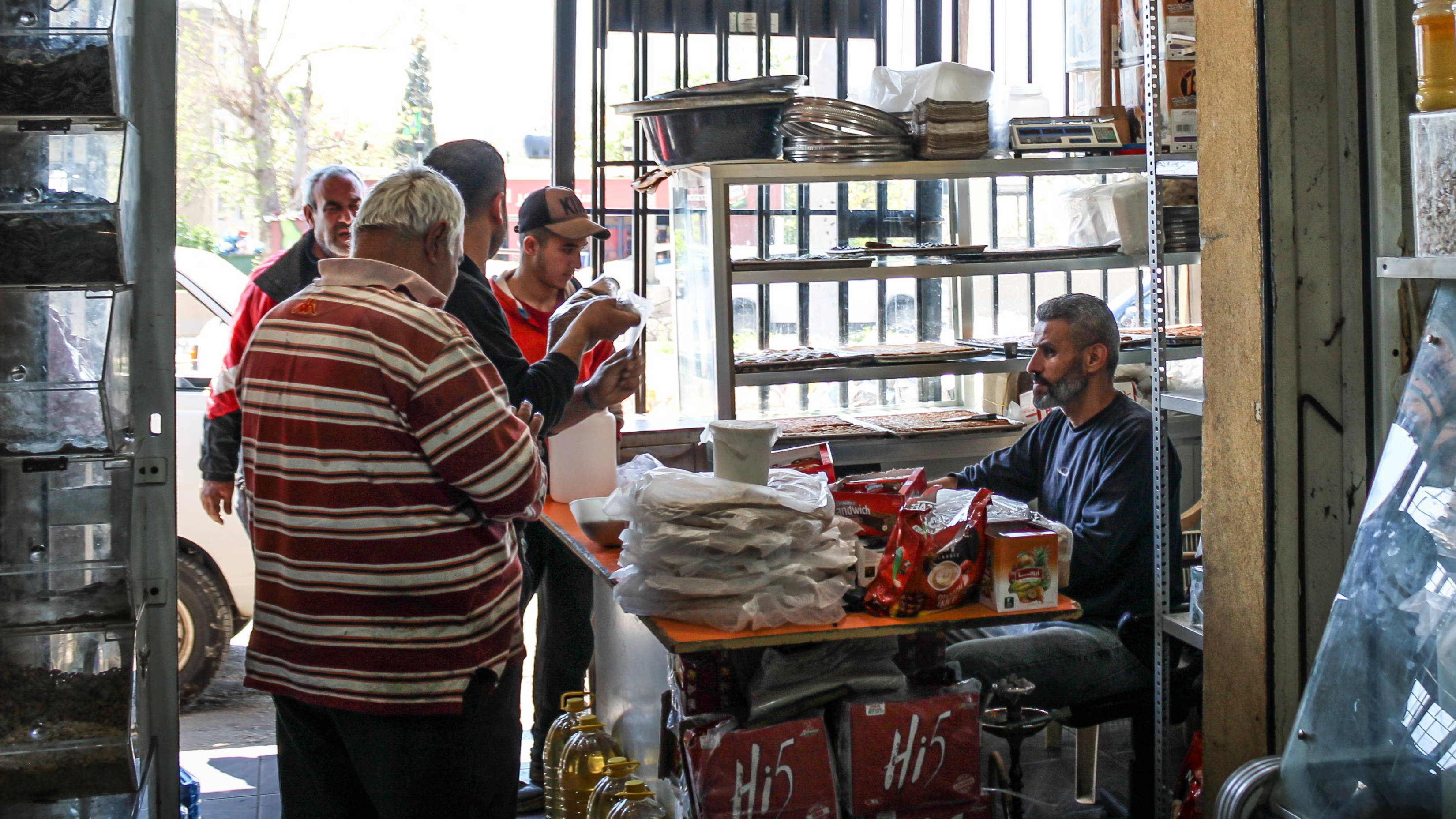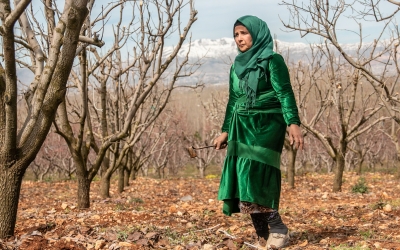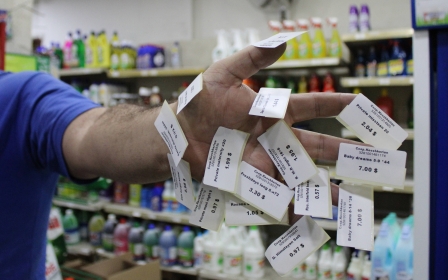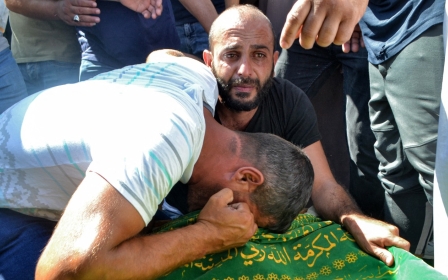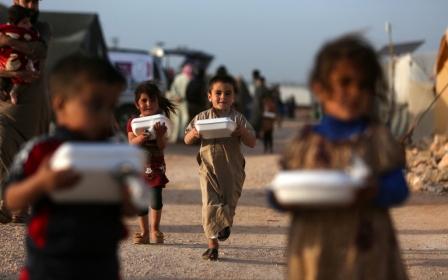Lebanon: What a stabbing in small town says of rising hostility against Syrian refugees
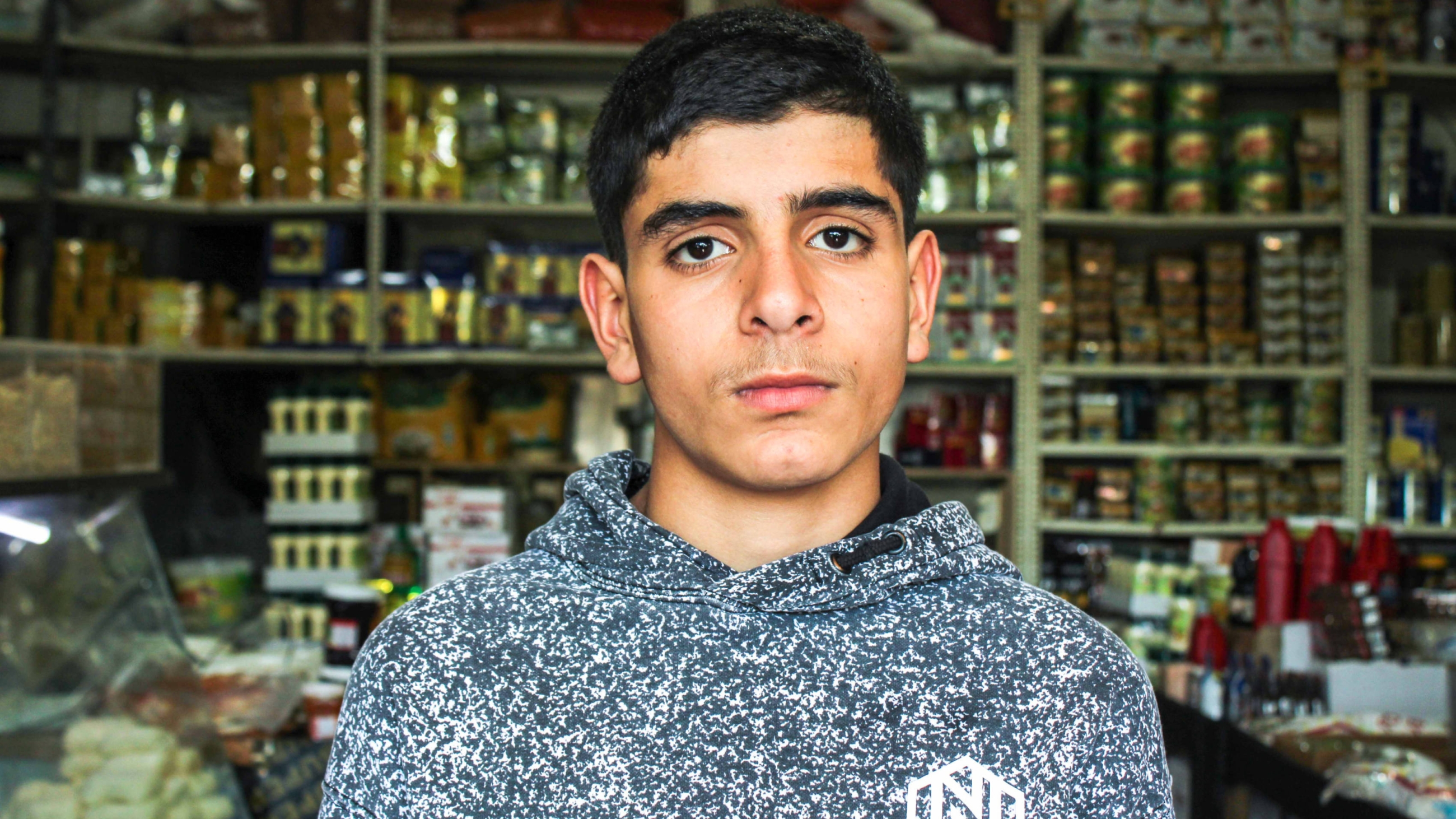
In Mohammed Amro's supermarket in Lebanon's Nahr Ibrahim, the floor is stained with blood and the roof pierced by two bullet holes - the scars of a brutal attack on his two sons.
The small northern town, wedged between the sea and the mountains, is usually a peaceful place, where people of all religions coexist, said most residents Middle East Eye interviewed.
But during the recent Eid al-Fitr holiday, usually a moment of joy to mark the end of Ramadan, the peace was broken.
At 8.30pm on 23 April, 13-year-old Sajed and 18-year-old Youssef were helping in their father's shop, when they saw a group of armed men with metal bars and handguns assaulting an unknown Syrian man outside.
"My brother was witnessing the scene without doing anything," Sajed told MEE.
New MEE newsletter: Jerusalem Dispatch
Sign up to get the latest insights and analysis on Israel-Palestine, alongside Turkey Unpacked and other MEE newsletters
"Then, out of nowhere, someone approached him and hit him with a thick stick. My brother tried to defend himself by kicking him off, so 20 other people followed, pulled out their knives and started stabbing him.
"Then they pulled out a gun", shot on the floor and the ceiling, and "stabbed me in the head".
Youssef, who was stabbed four times, survived the attack but was left with 20 stitches and a broken nose. Meanwhile, 10 medical staples keep Sajed's wound from gaping open. Although the pain is gone and the boy can return to school, he spoke about the attack through clenched a jaw and in brief sentences.
Mohammed said: "The knife that stabbed him was one millimetre close to killing him." He was home when he witnessed the assault over the live security camera footage before rushing to the scene.
"I felt that my son was going to die," he said.
The group of attackers was made up of two policemen and some citizens who claimed they worked for the Nahr Ibrahim municipality and were there to enforce a 9pm curfew, enacted six months ago on all shops in town.
"We limited opening hours at night to have more security, because Syrian immigrants with no legal papers were entering the area, and we could not monitor them," Nizar Daccache, a chief administrator in the municipality office, told MEE.
On the evening of the attack, the men were sent to control "Syrians causing problems in the area", he said.
Mohammed said the group regularly patrols the shops near his own business and harasses the mostly Syrian shopowners. This was their motive on the night of the attack - not to actually enforce the curfew, he said.
'They behave like a gang'
According to residents, the group had increased its aggressive behaviour and presence around the shops over the past month, coinciding with a wave of anti-refugee rhetoric and a crackdown on Syrians throughout the country.
In defence of the stabbing, the group claimed they thought the two boys were Syrian, Mohammed said. But his family are the only Lebanese who run a shop along the street.
"This was well-known to them, because two of the attackers were even customers of our shop."
Syrian or not, "they stabbed a 13-year-old without any reason... even if the kid was Syrian, they had no right to stab him", the father said.
Other residents suspected that the attackers were first targeting Syrian workers in the vicinity, but then assaulted the two boys because they witnessed the scene.
'They stabbed a 13-year-old without any reason... even if the kid was Syrian, they had no right to stab him'
- Mohammed Amro, father
"Perhaps they were on drugs," a resident of Nahr Ibrahim, who wished to be unnamed, told MEE outside Mohammed's shop. "They pretend to be a militia, but they behave like a gang."
For Daccache, the assault on the two Lebanese boys was "an accident", as the attackers were looking for Syrians, whose "illegal behaviours" had been "piling up". He criticised the Syrians for "creating chaos" and "affecting the market competition" in the town.
In Lebanon, many point to Syrians as the reason for their economic woes. The country is going through one of the world's worst economic crises, caused by years of financial mismanagement and corruption by the sectarian ruling elite and which has plunged over 82 percent of the population into multidimensional poverty.
The crisis is fuelling anti-Syrian resentment, according to Sami Nader, the director of the Levant Institute of Strategic Affairs.
"It's obvious that the Syrians are not responsible for the crisis, but their presence is amplifying it," he said.
"As the crisis remains unchecked, the issue [of Syrian refugees] is becoming harder and harder to accept and swallow by many Lebanese."
A report by World Refugee and Migration Council in 2021 concluded that, while refugees have placed pressure on the country, the economic crisis, which started in late 2019, was not caused by them, as its roots predate their arrival in Lebanon.
Meanwhile, Lebanon Crisis Response Plan has described the refugee crisis as a "humanitarian crisis within an economic crisis".
Political gains from racism
The same political leaders who brought Lebanon spiralling inflation and poverty have incited much of the hatred towards Syrian refugees.
The topic of refugees is "instrumentalised" by political parties, Nader said. As politicians vie for the presidency seat - the country has been in an executive vacuum since October - Syrians are an easy target to scapegoat for the failure to address critical reforms.
Lebanon's Cabinet last month enacted an array of restrictive measures over the 1.5 million Syrians residing in the country according to government estimates. It promised to continue its "voluntary return campaign", a series of measures designed to pressure Syrian refugees to return to their war-ravaged homeland.
Meanwhile, the Lebanese army deported at least 168 Syrians in April, according to a report by the Syrian Network for Human Rights. Amnesty International has documented the arrest and forced conscription of Syrian refugees deported from Lebanon upon their return and condemned the deportations as a "clear violation" of international law.
Multiple municipalities have also followed suit, implementing their own set of restrictions on Syrian residents.
Nahr Ibrahim is one of them: Daccache said the municipality conducts raids periodically to ensure Syrians are residing legally. "We need them [Syrians without papers] to leave because we cannot keep them illegally, especially in this small village."
But the government has imposed requirements that have made it almost impossible for Syrians to obtain legal residency in Lebanon, leaving the vast majority (80 percent) without valid residency permits and at great risk of fines, arrest, detention and deportation.
A party for the attackers
Those who face raids and arrests often have no legal protection.
Lebanon's legal system "obviously discriminates" against Syrian refugees, Fadel Fakih, the executive director of the Lebanese Centre for Human Rights told MEE.
The centre has seen an increase in the number of violations recently committed against Syrians, he said.
Fakih said that judges "often turn a blind eye to violations against Syrians" and tend to protect the perpetrators of violence.
'I feel unsafe... No one is here to protect either the Syrians or citizens like me'
- Town resident
In Nahr Ibrahim, the attackers were jailed, but shortly afterwards were released from custody, facing no additional penalties.
After their release, a celebration was even held for the attacker who stabbed Sajed Amro, and in attendance were municipality employees, including the mayor, Mohammed said.
"He's being called a hero," he said.
In this atmosphere of impunity, fear has risen among shopowners and residents along the stretch of shops in Nahr Ibrahim.
Hani, a young man who fled to Lebanon from Aleppo, Syria, in 2016, runs a small shop on the stretch, said: "The situation is more tense than before, as people are afraid they will be deported."
Now, the market is "almost empty", due to fear that the "forces from the municipality" will cause trouble.
The anonymous resident said: "I feel unsafe with what is happening, especially since they walk around with guns. No one is here to protect either the Syrians or citizens like me."
With additional reporting by Rayanne Tawil in Nahr Ibrahim, Lebanon
Middle East Eye delivers independent and unrivalled coverage and analysis of the Middle East, North Africa and beyond. To learn more about republishing this content and the associated fees, please fill out this form. More about MEE can be found here.


